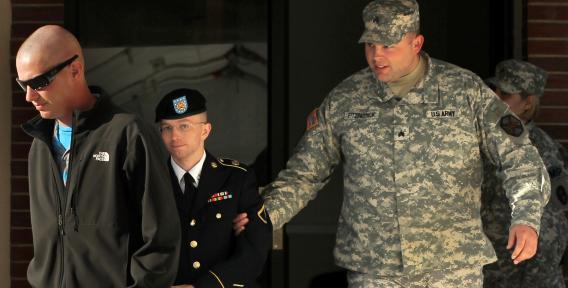Here’s something you might have missed among the news of royal babies, the “fiscal cliff,” and the Supreme Court’s decision to take on the gay marriage debate: The pre-trial hearing of Pfc. Bradly Manning is now in its second week. (Its 10th day kicked off Monday, to be exact.)
Manning, who faces 22 charges related to his alleged leak of hundreds of thousands of documents to WikiLeaks, has in turn charged that his jailers subjected him to unlawful pretrial confinement conditions. Manning’s lawyer wants the charges thrown out, but military Judge Col. Denise Lind could also decide to credit Manning for time served as a result of the pretrial hearings. Manning faces life in prison.
Manning’s argument centers around his extended confinement as a suicide risk in the Marine Corps brig at Quantico. As the Associated Press reported, Manning testified that he was “kept in a 6-by-8-foot cell, 23 hours a day, and allowed 20 minutes a day of recreation time.” He was also given a suicide smock in lieu of proper clothing to wear but argues that the conditions persisted even though he was not actually considering killing himself. Apparently, the former commander of the brig was less than forthcoming with an explanation for Manning’s extended isolation under these conditions:
Military regulations state that if there is no longer a risk of suicide, the detainee “shall be returned to appropriate quarters.” Defense attorney David E. Coombs asked why Manning was not removed from restrictive custody after brig psychiatrists judged him to be stable. Averhart replied that he did not move Manning into the general prison population because “shall does not mean immediately or right now.”
It’s interesting stuff, and Manning supporters (along with some media critics) are arguing that the pretrial proceedings are going under-covered. The AP has implicitly agreed, describing themselves as one of the few regular presences in the courtroom, along with “a handful of bloggers and WikiLeaks supporters.” The New York Times’ public editor Margaret Sullivan joined the fray last week, calling out her own publication’s “notably absent” coverage of the Manning case. Since then, the Times’ national security reporters have started to cover the hearings.
